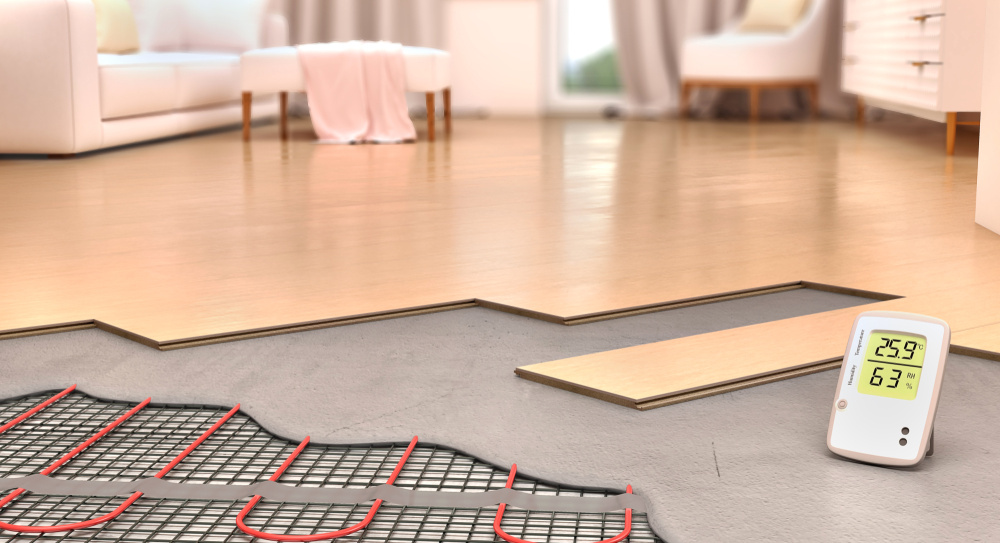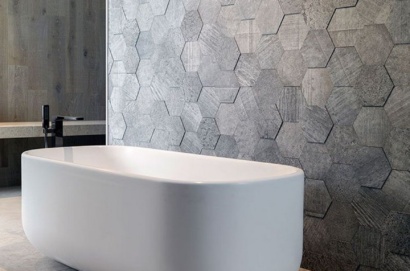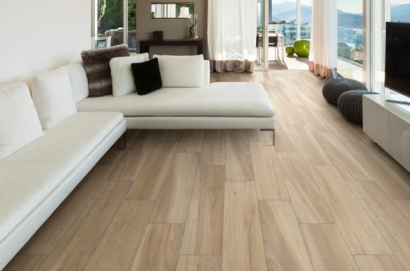The flooring industry has evolved significantly in recent years, embracing innovative technologies beyond aesthetics and functionality. Today, homeowners have access to smart flooring solutions that can enhance comfort, improve indoor air quality, and even monitor the health of their home environment. Advancements in flooring technology not only bring added convenience but also contribute to a healthier lifestyle. In this post, we’ll explore some of the latest trends in smart flooring solutions, such as heated floors, smart sensors, and eco-friendly materials that improve air quality.
Heated Floors: The Ultimate Comfort
Imagine stepping onto a warm floor on a cold winter morning—heated floors make this possible, providing comfort and energy efficiency benefits. Also known as radiant floor heating, this technology involves installing electric or hydronic (water-based) heating elements beneath the floor surface to distribute heat evenly.
Benefits of Heated Flooring
- Energy Efficiency: Heated floors are surprisingly energy-efficient, often using less energy than traditional heating systems. Radiant heat warms up objects and surfaces directly, rather than just the air, allowing rooms to retain warmth longer and require less heating overall.
- Improved Air Quality: Traditional heating systems can stir up dust and allergens by blowing warm air throughout a home. However, heated floors provide consistent warmth without circulating air, resulting in a cleaner, allergen-free environment.
- Even Temperature Distribution: Unlike traditional heating, which often creates hot and cold spots in a room, heated floors provide a uniform heat source that rises from the floor up, ensuring consistent warmth throughout the space.
Installation Considerations
Are you considering heated flooring for your Virginia home? It’s not just a luxury; it’s a smart choice. Electric systems are perfect for single rooms or small areas, like bathrooms or kitchens, offering indulgence and practicality. Hydronic systems, however, are ideal for larger spaces or whole-home installations, providing a comprehensive heating solution. In Virginia’s variable climate, heated flooring can be a luxurious and practical addition for chilly winters while remaining energy-efficient and cost-effective.
Smart Sensors: Flooring That Monitors Your Home’s Health
Smart sensors embedded within flooring can provide insights into your home environment, offering everything from temperature monitoring to security features. These sensors are often installed as part of a smart home ecosystem, allowing homeowners to monitor and control various aspects of their home from their smartphones or other devices.
Benefits of Flooring Sensors
- Temperature and Humidity Monitoring: Smart sensors can measure temperature and humidity levels, providing data that helps homeowners maintain an ideal environment. This is particularly beneficial in Virginia, where humidity can fluctuate throughout the year. You can help prevent mold growth or warped flooring by maintaining optimal levels.
- Water Leak Detection: One of the most valuable features of smart flooring sensors is water leak detection. Sensors installed beneath the flooring can detect moisture or water, alerting you to leaks early on and potentially preventing costly water damage. This is particularly useful in areas prone to spills or leaks, such as bathrooms, kitchens, and basements.
- Foot Traffic and Occupancy Tracking: Flooring sensors can track foot traffic, providing data on which areas of the home are most frequented. This information can be helpful for energy management, as it allows homeowners to optimize lighting and heating systems in line with usage patterns.
- Security Enhancements: Some innovative flooring systems are equipped with sensors that detect unusual vibrations or movements, which can enhance home security. For example, sensors might detect footsteps during certain hours and trigger an alarm or alert if unauthorized access is detected.
Integrating Sensors with a Smart Home System
To fully leverage the benefits of intelligent flooring sensors, it’s essential to integrate them with a broader smart home system. Many of these sensors are compatible with popular home automation platforms, allowing you to receive alerts, track data, and control various settings from a central app. This can be particularly beneficial for homeowners with busy lifestyles, as it provides a convenient and centralized way to manage the comfort and safety of your home.
Indoor Air Quality-Enhancing Materials: Breathing Easy at Home
Another significant advancement in flooring technology is the development of materials that improve indoor air quality. These flooring materials can actively reduce allergens, VOCs (volatile organic compounds), and other pollutants, contributing to a healthier living environment.
Air-Purifying Flooring Materials
- Low-VOC and Zero-VOC Flooring: Traditional flooring materials can sometimes emit VOCs, chemicals that are released into the air and contribute to indoor pollution. Many flooring manufacturers now offer low-VOC or zero-VOC options, which help reduce exposure to these harmful compounds. Common low-VOC flooring materials include engineered hardwood, bamboo, and cork. These options are ideal for homeowners looking to minimize toxins in the home while enjoying beautiful, high-quality floors.
- Antimicrobial Flooring: Some smart flooring solutions include antimicrobial properties, which prevent the growth of bacteria, mold and other allergens. This is particularly useful in high-moisture areas like bathrooms and kitchens, where mold and mildew are more likely to develop.
- Hypoallergenic Flooring Options: Hardwood, bamboo, and tile are considered hypoallergenic because they don’t trap dust, pet dander, or pollen the way carpet does. Additionally, these materials are easy to clean, allowing you to maintain a healthier environment with minimal effort.
- Formaldehyde-Free Engineered Wood: Engineered wood often uses adhesives that contain formaldehyde, a chemical that can be released into the air over time. Some manufacturers now offer formaldehyde-free engineered wood, reducing harmful emissions and improving air quality.
Additional Benefits of Flooring that Improves Air Quality
By choosing flooring designed to improve air quality, you’re contributing to a healthier indoor environment. This can be especially important for households with young children, elderly family members, or anyone with respiratory issues. With Virginia’s warm and humid summers, maintaining good indoor air quality can be challenging, but these materials make breathing easier year-round.
Combining Smart Flooring Options for Maximum Impact
Combining various options can create an integrated and highly functional flooring solution for homeowners who want to maximize the benefits of intelligent flooring. Imagine heating the floors in your bathroom with leak detection sensors to catch water leaks early or installing air-purifying flooring in a child’s playroom for optimal air quality.
When selecting an intelligent flooring solution, consider your household’s unique needs, the climate in Virginia, and how much you’re willing to invest in initial installation and ongoing maintenance. While some smart flooring options may have higher upfront costs, they can offer long-term savings, increased home value, and potential health benefits. By choosing the right smart flooring solution, you’re not just investing in your home’s comfort and convenience; you’re also investing in its future.
Choosing the Right Smart Flooring Solution for Your Virginia Home
The best flooring choice depends on various factors, including budget, lifestyle, and environmental conditions. Here’s a quick summary of factors to consider:
- For Comfort: Heated flooring is ideal for those who want extra comfort and energy efficiency in their home, especially in colder months.
- For Safety and Monitoring: Smart sensors can provide valuable data on humidity, temperature, and occupancy, making them a good choice for families who want to monitor their home environment closely.
- For Health and Air Quality: If air quality is a priority, consider low-VOC, antimicrobial, or hypoallergenic flooring materials that help keep your home’s environment clean and safe.
Smart flooring is an exciting innovation in home design, offering comfort, convenience, and peace of mind. By investing in these technologies, homeowners can future-proof their floors, create a healthier living environment, and add long-term value to their property.
As your flooring needs evolve, incorporating smart flooring solutions can set your home apart, enhancing its functionality and environmental responsibility. Whether remodeling a single room or building a new home, consider integrating one or more smart flooring solutions to create a modern, sustainable, and comfortable living space.





